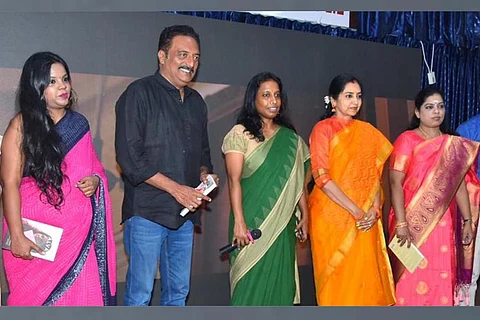

How difficult is it when you aren’t a man in today’s patriarchal world? Don’t answer that, it’s rhetorical. There are statistics to show just how much of a difficulty life and access to equality is for the other sexes and this, however, is nothing new. Change, nevertheless, is possible with equal representation of sexes and this has to begin at the political front.
A panel discussion titled ‘Penn and Politics’ held by Shakti, an organisation that rallies for equal political power to women, with the Madras School of Social Work in Chennai on February 26, opened up a great opportunity for students to interact with law makers and political analysts on the topic of having equal women representation in politics and governance. Members on the panel included Member of Parliament (DMK) Thamizhachi Thangapandian, Actor and politician Prakash Raj, AIADMK Spokesperson Sivashankari and social activist Shalin Maria Lawrence. The event was organised by Shakti, an organisation that rallies for equal political power to women.
We’ve seen women leaders from Indira Gandhi who served as the country’s Prime Minister to Pratibha Patil who was India’s President between from 2007 to 2012, to J Jayalalithaa, back home, who served as Chief Minister for a record number of 16 years (under different terms). If getting into politics is a struggle for a woman, staying put is a different story. And it is all the more difficult for Dalit women leades, which is perhaps why we often hear of Dalit women panchayat leaders being made to sit on the floor, not allowed to hoist flags and being disrespected.
DMK's Thamizhachi Thangapandian, who was part of the day’s panel shared a little about just how much of a struggle it is for a woman politician even today. “There are those who ask me why I wear flowers and jimikki and glass bangles. ’Why do you still dress up like this?' they ask. I am a woman who grew up in a village and this is how I’d like to dress. Who are they to decide what I should wear?” she asked to applause.
While her statement is indeed inspiring, the exchange she was put under just goes to show that no matter the woman’s achievement, she’ll still be sized up for what she wears. Some men, Tamizhachi, added, continue to be baffled when a woman demands for her equal rights. “Reservation is not something we have to beg for, it is our right. 50% is our right. First step is for more women to enter,” said the former Professor who taught at the city’s Queen Mary’s College. “Nothing is personal, everything is political,” she insisted adding that it was disheartening to see that young women today are wary to enter politics.
“When it comes to a woman, character assassination is quite common,” activist and writer Shalin Maria Lawrence said. “If she wears lipstick she’s considered bad, if she isn’t she’s considered to be good,” Tamizhachi added. “Personal lives of women are discussed in public. But no one cares about men,” Shalin pointed out.
Actor/politician Prakash Raj, who had flown in from Hyderabad for the session, said, “Women’s equal participation is empowering not just for her but also to us men. That is also a reason why the bill for 33% reservation is not being passed.”
Tamil Nadu’s women development indicators, as of 2017, show that the state has close to 1,800 women PhDs per one crore population. This stands way ahead from the rest of the country, Kerala for instance has 1,100 per crore and Gujarat has 370 per crore. Tara Krishnaswamy, co-founder of Shakti, began the session, in fact, with this statement. In many other fields too the women in Tamil Nadu seemed to fare better. But when it came down to how many of them turned towards electoral politics and become representatives in the state assembly and Parliament, the numbers are not encouraging like elsewhere.
To put things into perspective, Tamil Nadu has 56% women as Panchayat leaders, 8% women MLAs, 7% Lok Sabha MPs and none in the Rajya Sabha. “But women are indeed eligible and more importantly, winnable,” Tara exclaimed, with graphs on her presentation for proof. “I’d like to call it mangislation instead of legislation, manliament instead of parliament and manssembly instead of assembly. This is the truth today,” she added. Because, consider this, the state with over 10 lakh more women voters than men, has only three women MPs in the Lok Sabha.
Women have been denied their rights for ages but AIADMK’s spokesperson Sivashankari had an answer. “Don’t ask for your right. Take it. But make sure you use it right,” she said. “They’ve given us (women) 50% reservation in local bodies. But we need political power to solve all problems. Political power needs to be split equally. We need to be vocal about our problems,” she added.
“To create equal participation, the basic structure needs to be changed. We have to fight for it. But those fighting for it now are not us politicians. It is the social workers and journalists,” she said. The session then opened for questions, from reservations in the upcoming elections to having women represent more than just women’s wing in parties.